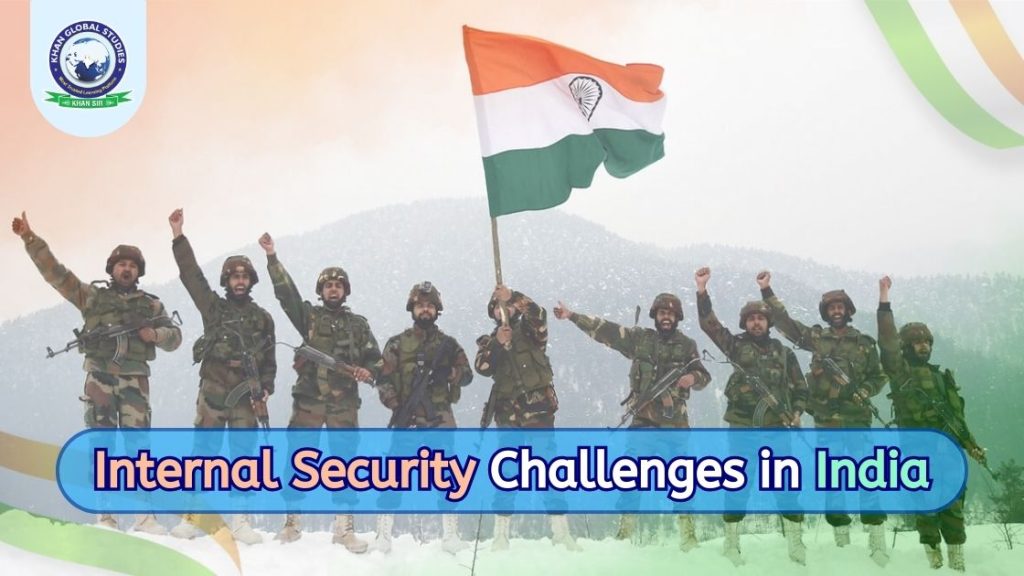India, a vibrant democracy with a rich cultural image, faces various internal security challenges that threaten its stability and progress. These challenges arise from a variety of sources including insurgency, terrorism, communal tensions and organized crime. Understanding these complex issues is important to appreciate the multifaceted nature of the internal security of India’s landscape.
Types of Internal Security Challenges in India
Rebellion and Separatist Movement
India is struggling with extremism and separatist movements in many areas. In the Northeast, various armed groups with demands ranging from autonomy to secession pose a persistent security challenge. The long-running conflict in Jammu and Kashmir is affecting the stability of the region. In central India, left-wing extremism, also known as Naxalism, maintains a significant presence in some areas, motivated by socioeconomic inequalities and grievances over land rights and development.
Terrorism
Terrorism, both cross-border and domestic, remains a major threat to India’s internal security. Pakistan-based terrorist groups have carried out several attacks on Indian soil, causing civilian casualties and disturbing peace. Additionally, the rise of fundamentalism and extremism within India has led to the rise of domestic terrorist organizations motivated by religious or ideological motivations.
Communal and Sectarian Tensions
In India’s society of diverse religions, castes and races, tensions can sometimes be seen between different communities. These tensions, often driven by historical grievances, political manipulation or competition for limited resources, can escalate into violence. Addressing the root causes of sectarian and communal conflict is important to maintaining internal harmony.
Organized Crime
Organized crime networks in India are involved in a variety of illegal activities including drug trafficking, human trafficking, extortion and money laundering. These networks often operate across borders, undermining the rule of law, economic stability, and social welfare.
Cyber Security
As India becomes increasingly digital, cyber security threats have increased rapidly. Cyberattacks, carried out by state and non-state actors, can target critical infrastructure, financial systems, and government networks, compromising national security and disrupting essential services.
Addressing the Challenges
India’s multifaceted internal security challenges demand a multidimensional and nuanced approach. Some essential strategies include:
- Socio-economic Development: Addressing underlying socio-economic inequalities, particularly in areas affected by insurgency and extremism, can reduce grievances and create pathways to peaceful resolution.
- Intelligence and Counter-Terrorism: Strengthening intelligence collection and sharing mechanisms is essential to prevent terrorist attacks and dismantle terrorist networks.
- Community Engagement: Promoting trust and dialogue between security forces and local communities is important to address security concerns and promote peace.
- Capacity Building: Enhancing the capabilities of police and paramilitary forces through better training, equipment and technology is critical for effective counter-insurgency and counter-terrorism operations.
- Cyber Security Measures: It is essential to implement strong cyber security frameworks and protocols to protect critical infrastructure and sensitive information from cyber-attacks.
- International Cooperation: It is essential to cooperate with regional and global partners to combat cross-border terrorism, organized crime and cybercrime.
Must Watch:
Looking Ahead
Maintaining internal security in a complex and diverse country like India is a constant challenge. As threats increase, India’s security apparatus must increasingly use robust countermeasures and preventive strategies that address the root causes of conflict and violence. By fostering a sense of shared security, fostering social harmony and investing in inclusive growth, India can create a more peaceful and secure future for its citizens.
Conclusion
Tackling internal security challenges in India requires a holistic approach that addresses socio-economic, political and technological dimensions. By understanding the roots of these challenges, India can make effective strategies to protect its internal security.
Also Read:
- Cyber Security: Introduction, Types, Benefits & Security Tips
- UP Police Constable Exam Cancelled and Re-exam in 6 Months




